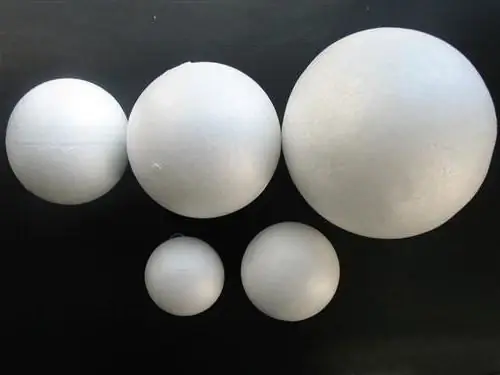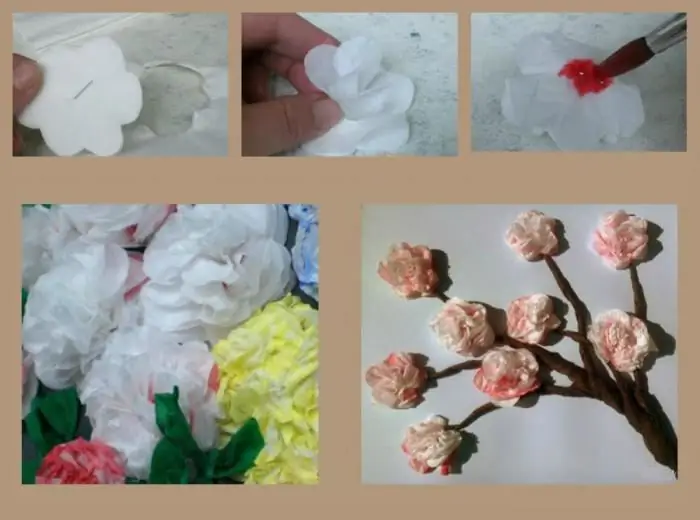
Table of contents:
- Author Sierra Becker becker@designhomebox.com.
- Public 2024-02-26 03:47.
- Last modified 2025-01-22 22:09.
Modern craft stores are practically bursting with a variety of materials. Many craftswomen do not even have time to realize the advantages of a particular foundation, as something new appears. Why do you need a bright floral fiber, sold in many specialized stores, and is there any way to save money on it? Amazing sisal: what it is and what you can make from it yourself, without attending expensive master classes, read in this article. The super popular material is easy to use and belongs to the category of natural bases for creative works.

What is sisal fiber made of?
This material is made from the leaves of the Mexican agave, a herbaceous shrub that grows in a subtropical climate. Sisal fibers are very stiff and quite coarse, but have a very high strength. Interesting,but their manufacture does not require any special technology and the unpainted material looks very natural, as it has a brilliant shade of yellow. The main purpose of such a fiber is the creation of durable ropes, ropes, decorative crafts, various brushes and washcloths. We are interested in the use of sisal as a material for handicrafts. But what to do if this amazing fiber is not sold in the city? You can make your own sisal with a little patience and inexpensive hardware store supplies.

We make fiber from improvised means
The easiest way would be to extract the material for needlework from an ordinary brush, which is used to whitewash houses. The cost of such a tool is negligible, only 60-70 rubles, and a large amount of fibers can be pulled from it. You need to choose brushes with a very thin and always natural pile. Sisal crafts come in a variety of colors, since the material itself is a linen shade, additional coloring of the resulting fibers is required. The process is also very simple.
To give the material a suitable color, powder or tablet food coloring is used, which can be stocked free of charge during various promotions taking place in stores before Easter. But you can just buy them very cheaply. Very hot water is poured into a suitable-sized plate, boiling water can be added, a tablespoon of ordinary vinegar and the desired dye are added. Sisal is divided into strands, which are soaked in the resulting solution for 2-2.5hours.

Secrets of sisal shades
The soaked material is laid out to dry on clean album sheets. It is better not to use a newspaper, as letters may be printed. To get a variety of shades, it is worth practicing in mixing dyes. You can also use ordinary brilliant green, blue, potassium permanganate, beetroot juice, coffee, strong tea and many other traditional substances that can convey their color to the material. To get a pure white sisal color, use the usual "Whiteness". Soak the fibers in this case for 6-8 hours or just overnight.
Linen or woven sisal - what is it? To create applications, sheets of this fiber are used, also dyed in various colors. For the manufacture of sisal fabric, an oilcloth is taken, on which the material is laid out in a fantasy order and covered with wallpaper glue on top. The resulting workpiece is covered with another layer of film and pressed down with a flat board.
What to do with finished materials
After a day, the sisal fabric will be ready for further use, it's time to make the first craft. Applications made from this fiber are considered very popular, as well as various topiaries, baskets, decorative shoes and even bouquets. For example, you can create a designer notebook, and decorate the cover with elements cut out of sisal fabric: birds, flowers or hearts. Volumetric figures are created on the basis of simple wire frames, which can be purchased at a florist's shop.or make your own.

Sisal material: Topiary master class
To create a unique craft in the form of a tree, the needlewoman will need a small set of tools and materials, as well as two hours of free time. What you will need:
- Sisal in matching color.
- A pot or jar to secure the structure.
- Floral wire, glue gun.
- Gypsum from the nearest hardware store.
- Special plastic or foam ball. You can make it yourself from tightly packed paper wrapped with thread or cut from a floral sponge.
- Decoration items: sisal balls, beads, satin ribbons, finished flowers and berries.
Working on the Topiary project
If you plan to use sesal balls, but you can't buy them, you can twist them yourself. The fiber is hard, keeps its shape perfectly. The size of these elements should not be larger than the berries, beads and flowers in the composition. A hole is made in the base ball and a wire or a regular twig is inserted to create the trunk of the future tree. Using a glue gun, we attach all the decorative details to the "crown" of the topiary. First, lay out large elements, filling in the gaps with small beads and flowers. The barrel is decorated with a satin ribbon, and the entire structure is placed in a pot and filled with diluted gypsum. After the “soil” in the pot has dried, the ugly top layer is covered with crumpled paper or sisal scraps, which will become"lawn". Everything, the topiary is ready - you can vary the colors and decor elements, which will always allow you to create new unique crafts.

Other natural fiber products
Probably the most famous use for this material would be sisal washcloth. Such a product has a natural wicker look, but it can also be made using a regular crochet hook. Sisal washcloth is not suitable for everyday use, but works great as a natural body scrub. Of course, the fiber for such crafts should not be dyed. I also use washcloths made of this material for a very effective anti-cellulite dry massage. For knitting, you should choose a hook of at least size 5. Thin tools are not suitable, otherwise the work will take a very long time, it will be too dense and rough. The smaller the distance between the loops, the worse such a washcloth will lather. To get maximum foam when bathing, you should insert an ordinary bath sponge inside.

Knit a sisal washcloth
The easiest way to make such a craft is to create a long tubular fabric from natural agave fiber. When asking in a sisal store what it is, you don’t have to explain, you can just ask for washcloth threads. At the beginning of work, a ring is knitted from air columns of a suitable size. Usually gain about 40 loops. After that, six to seven rows are knitted with standard single crochets. This will allow the product to keep its shape in the future, as well aswill hold the sponge inside if you want to insert it. The entire remaining length is knitted with elongated loops or columns with one or two crochets, as you like. Having knitted the entire length - about 30-40 cm, they finish with six rows of simple loops. Additionally, you can make handles for washcloths or sew a sponge inside. The finished product is washed before the first use with ordinary soap and soaked for several minutes in boiling water, which will make it a little softer.

Other types of sisal washcloths
A very pretty and useful craft made from natural agave fiber will be an option for more experienced knitters. A washcloth in the form of a ball or a coral sponge looks great and fits perfectly in the hand. Such a product can be used by children to wash their grimy feet and hands. To create such a model, you need to dial 50-60 air loops. After that, five rows are knitted with single crochets - the thread should not be cut off. Next, the resulting tape is sewn into a ring and pulled together into a fantasy ball. You can knit the washcloth into a mitt to make it more convenient to use for self-massage or as mini toys for children.
So, we have studied the sisal material, what it is and what can be done from it. It remains to wish our readers creative success and unlimited inspiration in their work. Do not forget to save on expensive floristic kits by making and dyeing sisal fibers in suitable colors. And most importantly: before using products made from this material, they should always be slightly soaked in soapy water.or pour over boiling water.
Recommended:
How to make figures from balls with your own hands?

From childhood, we associate a balloon with a holiday and joy. These multi-colored rounds have firmly taken their place in our lives, they help us make the celebration special and bring positive emotions not only to children, but also to adults. Inflated balloons can beautifully decorate any holiday, decorators and event agencies will be happy to get down to business. But you can try to perform the air composition yourself
Styrofoam balls and crafts from them: master classes, ideas and description. Styrofoam snowman

Styrofoam balls are a versatile base for making various crafts. Where can I buy such blanks and can I make them myself? Detailed workshops on making a snowman and topiary, as well as many other interesting ideas for creativity especially for you in our article
Easy paper crafts: diagrams and photos. Learning to make paper crafts with children

Children love to make paper crafts. This lesson develops fine motor skills, spatial thinking, accuracy and other useful qualities. The diagrams and photos offered in the article will help you make interesting products correctly
Crafts from balls of thread - beautiful and affordable

If you have an idea to decorate your house for the holiday, but do not have enough money for this, then crafts from balls of thread will allow you to do this without damaging the family budget. These decorations are very easy to make. Even a child can cope with such work, and the results of their own work will bring joy to the baby
How to make crafts from coins with your own hands. Crafts from penny coins

How can you spend your leisure time interestingly? Why not do something with your own hands? This article presents options for what crafts from coins can be. Interesting? More information can be found in the text of the article
